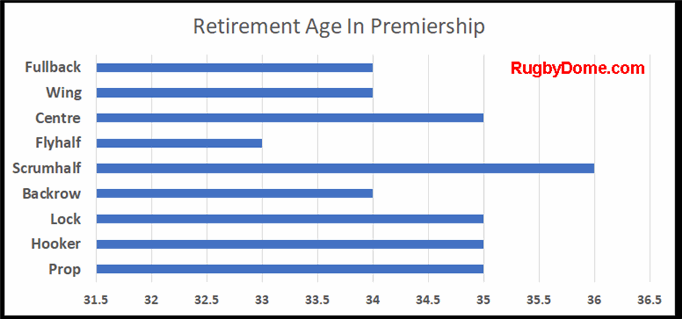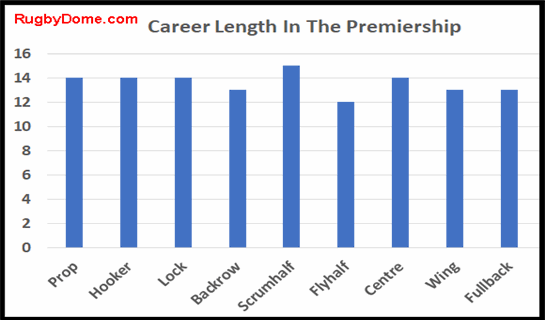How old are professional rugby players when they retire? And does the position they pay in influence their retirement age?
This article calculates the general age of retirement based on nearly 500 professional rugby players in England.
What Age Do Professional Rugby Players Retire?
The average retirement age for professional rugby players in England is 34 years of age. The retirement age in Ireland is slightly younger at 32 years.
Scrumhalves retire later than any other position at about thirty-six. Flyhalves retire earlier at about thirty-three.
In general, forwards retire a couple of years later than the outside backs.
The table below shows the general retirement age for each position. If you’re interested in how we calculated the numbers, check the section below the table.
Retirement age by position
This bar chart shows how positions compare to each other based on retirement age.

Here are the raw numbers. We’ve also included the oldest player in that position.
| Position | Retirement | Oldest Player (Excluded From Average) |
| Prop | 35 | John Afoa at Bristol |
| Hooker | 35 | August Creevy at London Irish |
| Lock | 35 | Apisalome Ratuniyarawa at Northampton |
| Backrow | 34 | Tom Wood at Northampton |
| Scrumhalf | 36 | Richard Wigglesworth at Leicester |
| Flyhalf | 33 | Jimmy Gopperth at Wasps |
| Centre | 35 | |
| Wing | 34 | Chris Ashton at Worcester |
| Fullback | 34 | Mike Brown at Newcastle |
How we calculated the numbers
First, I compiled a list of the current age of every player in clubs in the England Premiership.
Then I looked at the maximum age for each position. This review showed me that there were outliers where a single player was significantly older than everyone else in his position.
For example, three players were 38 at the time of writing. They were up to five years older than others in their position.
So, I removed the oldest player in each of these positions. You can see the details in the last column in the table.
Finally, I calculated the retirement age as a year older than the new maximum age of players in that position.
What about other countries?
We’ve based our calculations on 495 professional rugby players in the England Premiership.
But do these figures apply to other countries? I’ve crunched the numbers for neighboring Ireland later in this article. Interestingly, the players there retire a little earlier.
Why Do Forwards Retire Later Than Backs?
It may surprise you that forwards retire at an older age than backs. After all, forwards take more wear and tear to their bodies due to the more physical nature of their positions.

But rugby isn’t just a collision sport of heavy tackles and hard rucking. It is also a game of speed and agility for the outside backs.
When athletes are past their physical peak, the loss of speed becomes more pronounced than the loss of strength.
This is why fullbacks and wingers lose their place to speedy youngsters of twenty or twenty-one.
Older forwards will tell you that they weren’t that fast to begin with! However, they tend to have more muscle mass than their young academy counterparts.
This makes prop forwards harder to budge from a rugby team – both physically and metaphorically.
How Long Is A Rugby Player’s Career?

The average length of career for professional rugby players in the England Premiership is thirteen and a half years.
In general, scrum-halves have the longest careers in rugby. Their half-back partners, the flyhalves, have the shortest professional careers.
This bar chart shows that there isn’t a lot of difference between the positions.

Here are the raw numbers:
| Position | Career Length |
| Prop | 14 |
| Hooker | 14 |
| Lock | 14 |
| Backrow | 13 |
| Scrumhalf | 15 |
| Flyhalf | 12 |
| Centre | 14 |
| Wing | 13 |
| Fullback | 13 |
How we calculated the numbers
Given that we know the general retirement ages at each position, we can also calculate the length of a rugby player’s career.
Most players get their first professional contract at the age of twenty-one.
Some exceptional youngsters develop earlier and pick up a contract at twenty. But at the time of writing, only twelve players were aged twenty or younger amongst the 495 players contracted with English professional clubs.
Therefore, I used the age of 21 as the starting point for rugby careers and substracted this from the retirement age.
What Age Do Professional Rugby Players Retire In Ireland?

The average retirement age at the four Irish professional rugby teams is 32 years old.
Forwards tend to be a year or more older than outside backs when they retire. Props last the longest, while the fullback position sees the earliest retirement ages.
Retirement age by position at Irish rugby clubs (provinces)
| Position | Retirement | Oldest Player (Excluded From Average) |
| Prop | 34 | Cian Healy at Leinster |
| Hooker | 32 | Sean Cronin at Leinster |
| Lock | 33 | Devin Toner at Leinster |
| Backrow | 33 | Duane Vermuelen at Ulster |
| Scrumhalf | 32 | Conor Murray at Munster |
| Flyhalf | 33 | Jonny Sexton at Leinster |
| Centre | 31 | Bundee Aki at Connacht |
| Wing | 33 | Keith Earls at Munster |
| Fullback | 28 | Simon Zebo at Munster |
Why do players in Ireland retire a little younger?
This is a little younger than in England. Why might that be? Well, players in Ireland are also on lower salaries on average when compared to England.
If you want the details, check out these two articles:
- How much do professional rugby players earn in England?
- How much do professional rugby players earn in Ireland?
As players get into their thirties, they typically get lower-paid contracts than for their peak years. Of course, there are stars who hold their value.
This means that there is less incentive for Irish players to eke out another year on lower pay. They have to consider when to launch a new career for the rest of their working life.
What About Other Rugby Roles?
Unfortunately, many players don’t get to decide when to retire from rugby. Injury can cut careers short. In some cases, players will move into a coaching role. Others may pick up a whistle.
But refereeing also isn’t a long-term career. Check out our article on when rugby referees retire.